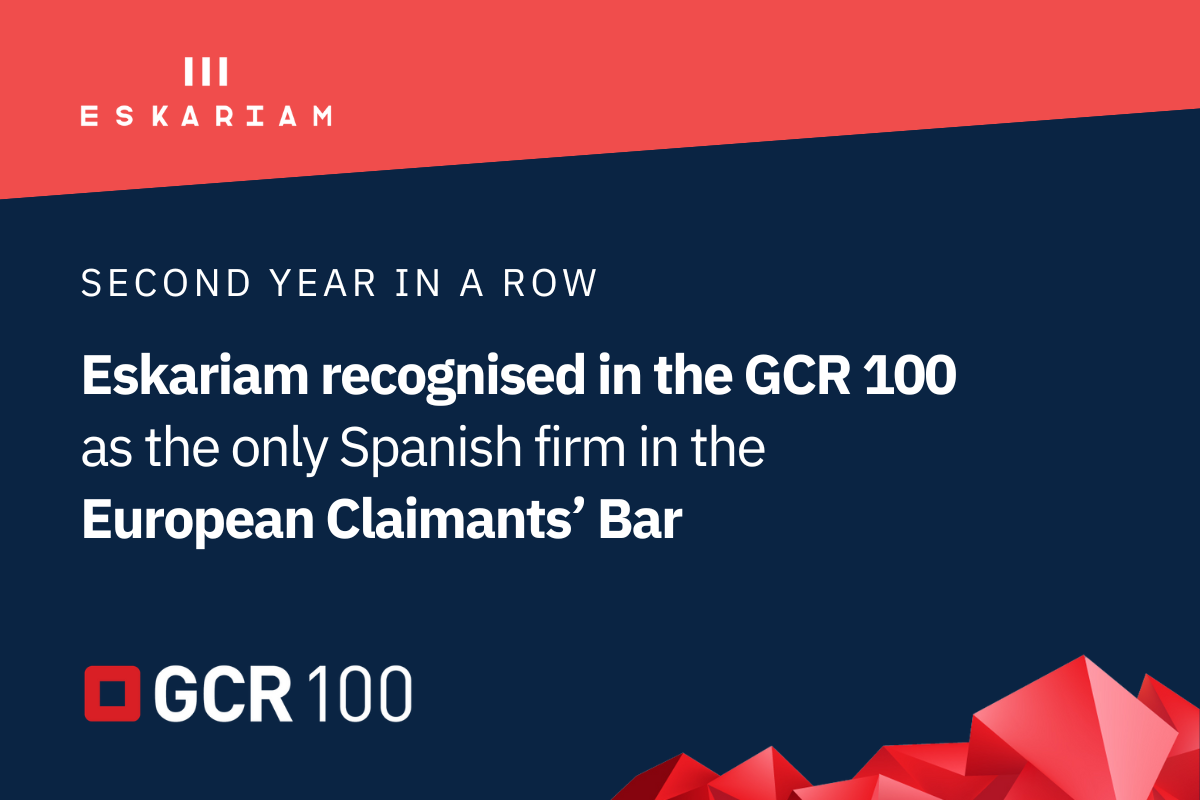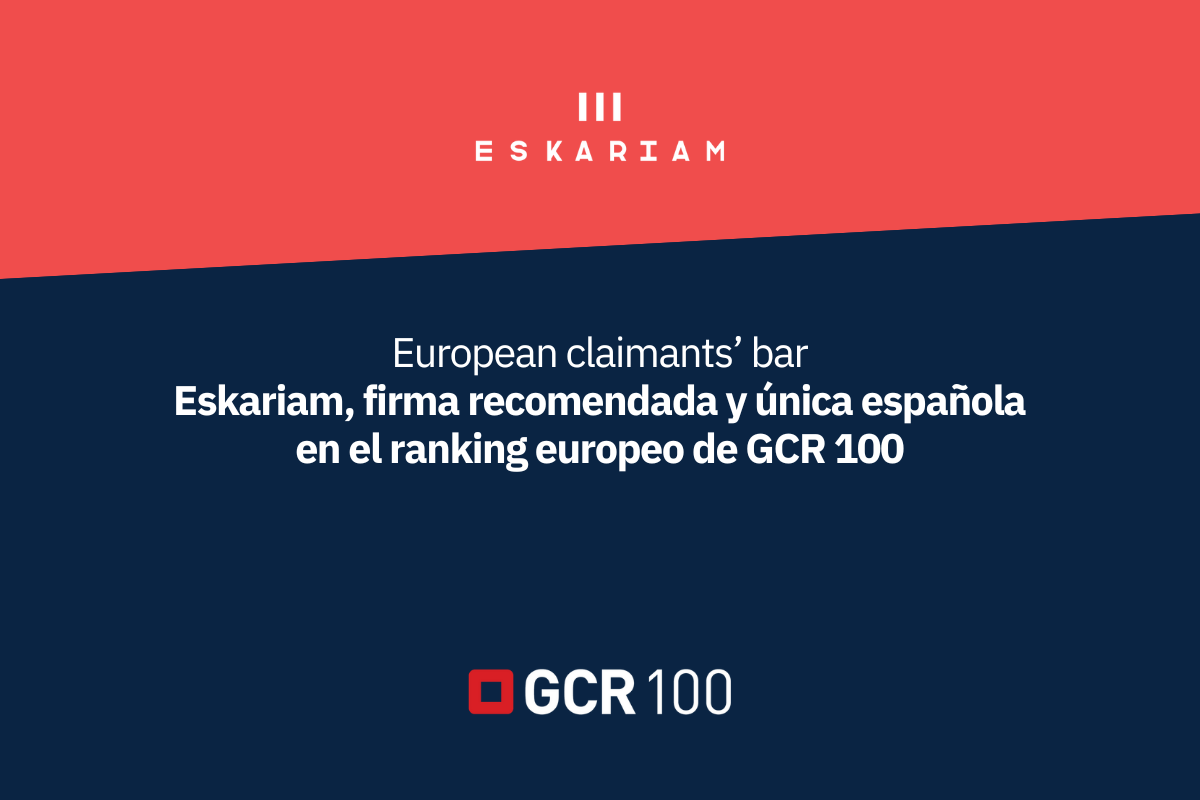Euribor cartel: The CJEU holds that there is no distinction to be made between consumers, professionals or undertakings for the purposes of determining the dies a quo of the limitation period

The Court of Justice of the European Union has clarified, in an important ruling in the well-known ‘Euribor cartel’ case, that no distinction can be made between those harmed by a cartel, whether consumers, professionals or undertakings, for the purposes of determining when the limitation period begins to run, and reiterated a number of temporal issues relating to the commencement of the limitation period in proceedings for damages for infringements of EU competition law which had already been highlighted in the judgment of 22 June 2022 in Case C 267/20 Volvo and DAF Trucks. Enrique Ruiz, Lawyer
Equipo ESKARIAM
On 6 March 2023, the Court of Justice of the European Union (CJEU) published the Order with which it responded to the questions referred for a preliminary ruling by the Commercial Court no. 11 of Barcelona in the context of several joined lawsuits arising from the ‘Euribor cartel’, which arose as a result of the sanctioning decision adopted by the European Commission for a single and continuous infringement of Article 101 of the Treaty on the Functioning of the European Union (TFEU) and Article 53 of the Agreement establishing the European Economic Area, the purpose of which was to alter the normal course of pricing in the market for derivatives on euro interest rates related, in particular, to the Euribor, between approximately 2005 and 2008.
The Barcelona judge urged the EU body to shed light on whether the fact that it is a consumer, and not a professional or company, who is the injured party in a sanctioned collusive practice, affects or conditions the determination of the initial day for the exercise of the action for damages, due to the greater or lesser knowledge that he may have of the indispensable elements that allow him to exercise an action for damages.
In addition, the referring judge asked the European body about the applicable statute of limitations for actions for damages (whether one year, according to the Spanish Civil Code, or five years following the entry into force of the Community Directive 2014/104 on damages) in order to know, in essence, whether the application of the five-year time-limit for bringing an action for damages would be justified, whether the application of the five-year limitation period for claiming damages for anti-competitive practices applies in cases in which, despite referring to an infringement that ended before the entry into force of that Directive, it was brought after the entry into force of the provisions transposing that Directive into national law.
Regarding this last point, which corresponds to the first and third questions referred for a preliminary ruling in the Order of the CJEU of 6 March 2023, we will not dwell on the infinite amount of literature which arose as a result of the judgment of the CJEU of 22 June 2022 in the context of a claim for damages arising from the lorry cartel, and which in no way modifies or expands on the recent Order of the CJEU. However, it is worth recalling the most relevant issues, now consolidated, regarding the statute of limitations, the real touchstone to date in damages proceedings brought in Spain.
Firstly, the European Court clarified that the limitation periods applicable to actions for damages for infringements of competition law cannot start to run before the infringement has ceased and the injured party is aware or could reasonably have been aware both of the fact that it has suffered harm as a result of the infringement and of the identity of the perpetrator of the infringement.
Next, as regards knowledge of the fact that he has suffered damage as a result of an infringement of EU law, the Court makes clear that it is reasonable to consider that the injured party may reasonably be regarded as having become aware of the essential elements enabling him to bring an action for damages on the date of publication of the summary of the Commission’s decision in question in the Official Journal of the European Union. It is therefore an objective element, the publication in the Official Journal of the European Union of the summary of the decision concerned, which is the point in time from which the limitation period may reasonably be considered to begin to run.
Lastly, the CJEU is in favour of the temporary application of the limitation rules of Article 10 of Directive 2014/104 (five years, plus one year from the date of final judgment) to existing legal situations (created previously) in so far as they are not already consolidated before the expiry of the time-limit for transposition and continue to produce their effects under its force.
In the case recently analysed by the CJEU, in identical terms to the ruling of the same Court in its Judgment of 22 June 2022, the European Court of Justice concludes that, regardless of whether the facts of the infringement were prior to the expiry of the deadline for its transposition, the fact is that the parties were aware of the infringement, and that they were aware of it before the expiry of the deadline for its transposition, the fact remains that the parties became aware of the damage caused by the infringement on 30 June 2017 (the date of publication in the Official Journal of the European Union of the summary of the Euribor Cartel Decision) and that, therefore, the action for damages was fully alive when the period for transposition of the Directive expired. As a result, the statute of limitations of the Directive applies ‘ratione temporis’ to the action, which provides not only for a longer limitation period (five years), but even for the interruption of the period until one year after the decision adopted by the competition authority, if applicable, has become final (Article 74.3 LDC, which derives from Article 10.4 of the Directive).
Having established the bases that should govern any analysis of the statute of limitations, we must now consider the novelty introduced by the CJEU in its response to the second question referred for a preliminary ruling by the 11th Commercial Court of Barcelona.
The European Court, taking the baton from its predecessor (judgment of 22 June 2022, Volvo and DAF Trucks, C-267/20), determines that the injured parties, in their capacity as consumers, may reasonably be considered to have been aware of the essential elements enabling them to bring an action for damages on the date of publication of the summary of the final settlement decision in the Official Journal of the European Union, namely 30 June 2017.
In doing so, the CJEU focuses on the irrelevance, as a general rule, of the status of the claimant of damages, be it consumer, professional or business. In other words, there is no need to distinguish between consumers, on the one hand, and professionals or businesses, on the other, for the purposes of determining the point at which the limitation period begins, which is none other than the point at which the summary of the relevant decision was published in the Official Journal of the European Union, since this is the point at which an average consumer, reasonably well informed, attentive and circumspect, whether a professional, business or individual consumer, was or could reasonably have been aware of the information necessary to bring an action for damages.
A sensu contrario, if a distinction were to be drawn between injured parties, with a view to determining when the limitation period begins to run, this would create enormous uncertainty in the application of Articles 101 TFEU and 102 TFEU, which would ultimately be contrary to the principle of legal certainty.
It can be seen that this decision of the CJEU, putting on the table the same rules of the game on the five-year limitation period regardless of the status of consumer or company, opens the door to a greater number of claims in a booming sector.
Eskariam, a law firm specialising in claims for damages against the dairy industry that represents more than 7,000 farmers affected by the well-known Milk Cartel, praises the work carried out by the CJEU in clarifying, time and again, for the purposes of applying the limitation period, that the decisive factor is not when the infringement occurred, but when the action to claim damages arising from that infringement arises and whether that action was still in force – not time-barred – when the deadline for transposition of the Directive expired.
Hence the importance for those affected by damages arising from anti-competitive infringements to have the advice of a team with experience in claiming damages and to ensure that they have specialists who interrupt the statute of limitations within the applicable time limits in order to have the legal action in force and their rights intact.
At ESKARIAM, as specialists in collective claims and class actions, we advocate for efficient justice that allows consumers and affected parties to be able to exercise their right to claim against the abuses of large corporations.
At ESKARIAM we move forward.
Otras Noticias
¿Te ayudamos?
Contacta con nosotros



